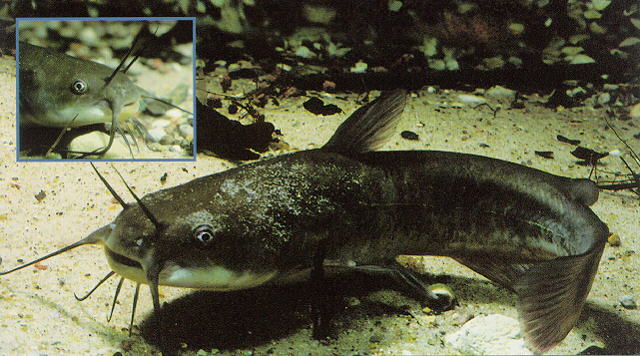| Ictaluridae (North American freshwater catfishes) |
| 55 cm TL (male/unsexed); max.weight: 2,740.0 g; max. reported age: 9 years |
|
demersal; freshwater; depth range 0 - 12 m |
| North America: Atlantic and Gulf Slope drainages from Nova Scotia and New Brunswick in Canada to Mobile Bay in Alabama in USA; St. Lawrence-Great Lakes, Hudson Bay, and Mississippi River basins from Quebec west to southeastern Saskatchewan in Canada, and south to Louisiana, USA. Introduced into several countries. Several countries report adverse ecological impact after introduction. |
|
Dorsal spines (total): 1-1; Dorsal soft rays (total): 6-7; Anal spines: 1-1. Caudal fin with 18-19 rays. |
| Occurs in pools and sluggish runs over soft substrates in creeks and small to large rivers. Also found in impoundments, lakes, and ponds (Ref. 86798). Rarely enters brackish waters (Ref. 1998). A nocturnal feeder that feeds mollusks, insects, leeches, crayfish and plankton, worms, algae, plant material, fishes and has been reported to feed on eggs of least cisco, herring and lake trout (Ref. 1998). Juveniles (3-6 cm) feed mostly on chironomid larvae, cladocerans, ostracods, amphipods, bugs and mayflies (Ref. 1998). Can tolerate high carbon dioxide and low oxygen concentrations and temperatures up to 31.6 °C although experiments show upper lethal temp. to be 37.5 °C; resistant to domestic and industrial pollution (Ref. 1998). Has been observed to bury itself in mud to escape adverse environmental conditions (Ref. 1998). Prepared hot-smoked and also cooked in various ways (Ref. 1998). |
|
Least Concern (LC); Date assessed: 14 October 2011 Ref. (130435)
|
| potential pest |
Source and more info: www.fishbase.org. For personal, classroom, and other internal use only. Not for publication.
